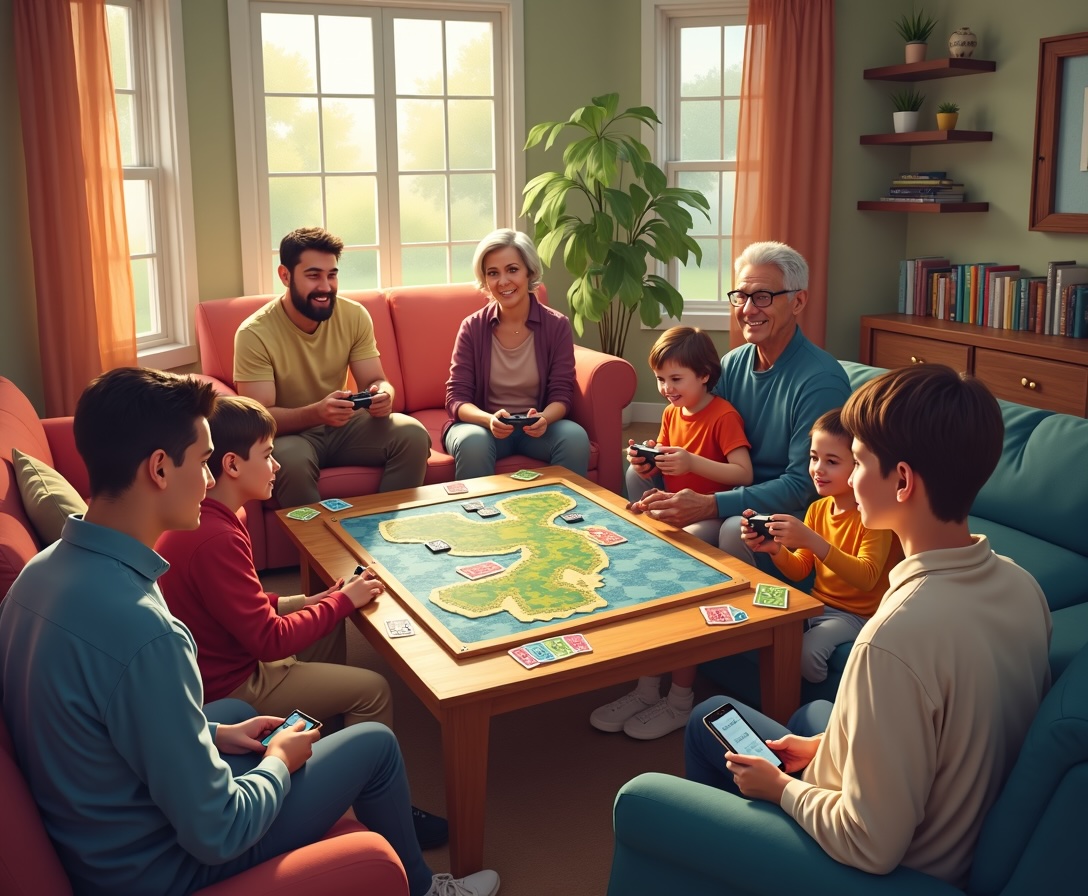Our Approach to Video Games, Board Games, Card Games, and Mobile Apps for Christian Families
Published: June 2025 | Reading Time: 13 minutes | Methodology Explanation
“Interactive content is just entertainment and learning tools, right? Games are about fun and skill-building. Why do they need the same detailed analysis as books or movies when people are actively choosing what to do?”
This assumption—that interactive media is automatically less influential because users have control—fundamentally misunderstands how participation and engagement affect learning, behavior, and character formation. Interactive content doesn’t just present ideas for passive consumption; it requires active decision-making, repeated practice, and sustained engagement that can shape thinking patterns, social skills, and moral reasoning more profoundly than any other media type.
The power to participate makes interactive media uniquely influential—for better or worse.
TL;DR (1-minute read)
Interactive media creates deeper character influence than passive consumption because participation and repeated practice build neural pathways that affect real-world behavior and decision-making. Video games, board games, card games, and mobile apps don’t just present ideas—they require active choices, problem-solving, and skill development that can transfer to family relationships and moral reasoning. Unlike entertainment consumed once, interactive content involves practicing the same decision-making patterns repeatedly, while reward systems use psychological conditioning to shape behavior.
Social dynamics in family gaming create additional learning opportunities for cooperation, competition, and conflict resolution. Our reviews evaluate not just content themes but mechanical design, reward structures, and engagement patterns to help families choose interactive experiences that build character, strengthen relationships, and support rather than undermine Christian values and healthy lifestyle balance.
The Unique Power of Interactive Media
Why Interactive Content Demands Special Attention
Active Participation Creates Deeper Learning: Interactive media requires users to make choices, solve problems, and practice behaviors repeatedly over extended periods. Research on active vs. passive learning demonstrates that participation increases retention, skill transfer, and behavioral change compared to observation alone.¹
Reward Systems Shape Behavior Patterns: Games use psychological principles of reinforcement to motivate continued engagement. Studies on operant conditioning and gamification show that variable reward schedules create powerful habit formation and can influence real-world behavior patterns and decision-making.²
Repeated Practice Builds Neural Pathways: Unlike media consumed once, interactive content involves repeated engagement with the same decision-making patterns and moral frameworks. Neuroscience research on skill acquisition demonstrates that repeated practice creates lasting neural pathways that influence automatic responses and preferences.³
Social Dynamics Influence Character Development: Many interactive media involve family members, friends, or online communities, making gaming choices impact relationship patterns and social skill development. Research on social learning theory shows that interactive group experiences significantly influence moral reasoning and behavioral norms.⁴
Time Investment Creates Identity Integration: Interactive media often requires significant time investment, making the experience more central to personal identity and daily routine than shorter media consumption. Studies on time use and identity formation demonstrate that sustained activities become integrated with self-concept and personal values.⁵
Example: A child who spends 100 hours playing a strategy game that rewards deception and resource hoarding doesn’t just learn game mechanics—they practice decision-making patterns that can influence real-world approaches to competition, cooperation, and ethical reasoning.
The Biblical Foundation for Interactive Engagement
Scripture recognizes that participation shapes character more than observation. God designed learning through doing, practice, and community engagement as primary methods for spiritual and moral development.
“Train up a child in the way he should go; even when he is old he will not depart from it” (Proverbs 22:6).
“But be doers of the word, and not hearers only, deceiving yourselves” (James 1:22).
“Iron sharpens iron, and one man sharpens another” (Proverbs 27:17).
The biblical emphasis on practice, repetition, and interactive community reflects deep understanding of how character formation works. Interactive media harnesses these same powerful learning mechanisms—making content selection and family context crucial for spiritual and moral development.
What Makes Our Interactive Media Reviews Different
1. We Understand Format-Specific Considerations
Traditional Approach: Evaluate all interactive content the same way, focusing primarily on obvious content concerns like violence or language.
Our Approach: Recognize that video games, board games, card games, and mobile apps create distinct interactive experiences with unique learning opportunities and character formation implications.
Why This Matters: A cooperative board game, a competitive card game, a mobile puzzle app, and a multiplayer video game all teach different lessons about problem-solving, social interaction, and goal achievement through their mechanical design and interaction patterns.
Video Games: Digital Worlds and Extended Engagement
- Immersive Environment: Players inhabit virtual worlds with different rules, values, and social structures than real life
- Achievement Systems: Complex reward mechanisms designed to maintain engagement and create sense of progress and accomplishment
- Online Social Dynamics: Interaction with strangers through voice chat, text, and collaborative or competitive gameplay
- Time Investment: Often require substantial time commitments to achieve meaningful progress or social connection
- Skill Transfer: Problem-solving, strategic thinking, and reflexes developed in-game can transfer to real-world applications
Board Games: Face-to-Face Social Learning
- Direct Social Interaction: Players practice communication, negotiation, and conflict resolution in person with family and friends
- Turn-Based Decision Making: Structured opportunities to observe consequences of choices and learn from others’ strategies
- Rule Following and Fair Play: Practice with authority structures, rule compliance, and handling disagreement appropriately
- Emotional Regulation: Learning to handle winning, losing, frustration, and competition in healthy social contexts
- Cognitive Development: Strategic thinking, planning, probability assessment, and pattern recognition in social settings
Card Games: Strategy and Social Dynamics
- Information Management: Learning to work with incomplete information, make decisions under uncertainty, and adapt strategies
- Memory and Attention: Developing working memory, attention to detail, and tracking multiple variables simultaneously
- Social Reading: Learning to interpret others’ behavior, intentions, and emotional states through gameplay interaction
- Quick Decision Making: Practice with time pressure, risk assessment, and adapting to changing circumstances
- Mathematical Thinking: Probability, odds calculation, and resource management in engaging, practical contexts
Mobile Apps: Accessibility and Habit Formation
- Constant Availability: Always-accessible entertainment and learning that can become integrated into daily routines and habits
- Personalized Experience: Adaptive algorithms that adjust difficulty and content based on user behavior and preferences
- Micro-Engagement: Short session design that encourages frequent, repeated interaction throughout the day
- Progress Tracking: Detailed analytics and feedback systems that create sense of achievement and continued motivation
- Social Integration: Connection to social media, friend networks, and competitive/collaborative features
2. We Evaluate Mechanical Design and Values Integration
Traditional Approach: Focus primarily on content themes and surface-level appropriateness.
Our Approach: Analyze how game mechanics, reward systems, and interaction patterns teach values and shape behavior through the structure of play itself.
Why This Matters: A game’s mechanics often teach more powerful lessons than its stated theme. A cooperation-themed game that mechanically rewards betrayal teaches different values than its story suggests.
3. We Consider Long-Term Engagement Patterns
Traditional Approach: Evaluate individual games or apps in isolation.
Our Approach: Consider how interactive media consumption patterns affect family relationships, time management, and character development over months and years of engagement.
Why This Matters: Interactive media’s high engagement and time investment mean that gaming habits become integrated into family culture, daily routines, and personal identity in ways that require long-term perspective.
Our Interactive Media Evaluation Framework
Content Analysis Categories
Values and Decision-Making Systems
- What moral choices do players make, and what outcomes are rewarded by the game’s mechanical structure?
- How are conflict, competition, cooperation, and resource sharing handled through gameplay?
- What approaches to problem-solving, leadership, and social interaction are modeled and practiced?
- How do winning conditions and success metrics align with or conflict with Christian principles and family values?
Character Development and Social Learning
- What character traits are rewarded or punished through game mechanics and social interaction?
- How are authority, rules, fairness, and consequences represented and practiced?
- What examples of leadership, service, empathy, and interpersonal skills are provided and developed?
- How does the interactive experience affect behavior patterns and relationship skills outside the game?
Educational Value and Skill Development
- What academic, cognitive, social, or life skills are genuinely developed through interactive engagement?
- How effectively does the experience achieve stated learning objectives compared to alternative activities?
- Are educational elements meaningfully integrated or superficially added to entertainment mechanics?
- Do learning outcomes and skill development justify time investment compared to other family activities?
Time Management and Habit Formation
- How does the interactive experience affect family time balance, relationship priorities, and daily routine management?
- What engagement patterns and habit formation mechanisms are built into the design?
- How does the activity support or compete with family responsibilities, spiritual practices, and other developmental needs?
- What safeguards exist for managing healthy boundaries and preventing compulsive use patterns?
Social Dynamics and Family Impact
- How does the interactive experience bring families together or create isolation and conflict?
- What social skills, communication patterns, and relationship dynamics are practiced and reinforced?
- How are different age groups, skill levels, and personality types accommodated and included?
- What opportunities exist for positive family bonding, shared achievement, and meaningful conversation?
Format-Specific Evaluation Criteria
Video Games: Digital Environment Analysis
- Content appropriateness including visual themes, language, violence, and cultural elements
- Online safety considerations including stranger interaction, privacy protection, and community standards
- Engagement design and addiction potential including reward schedules, progression systems, and time pressure mechanics
- Educational integration and skill transfer potential including problem-solving, creativity, and strategic thinking development
Board Games: Social Learning Assessment
- Family interaction quality including cooperation opportunities, conflict resolution practice, and communication skill development
- Rule complexity and age accommodation including learning curve management and inclusive gameplay design
- Character development opportunities including patience, strategic thinking, good sportsmanship, and empathy building
- Educational integration including academic skill practice, critical thinking development, and cultural literacy enhancement
Card Games: Strategic Thinking Evaluation
- Cognitive skill development including memory, pattern recognition, probability assessment, and strategic planning
- Social interaction quality including negotiation practice, emotional regulation, and fair play development
- Age range accommodation including complexity scaling, learning support, and inclusive participation opportunities
- Educational value including mathematical thinking, decision-making under uncertainty, and analytical skill development
Mobile Apps: Digital Engagement Analysis
- Screen time impact and healthy digital habit formation including session management, break encouragement, and balanced lifestyle support
- Privacy and safety considerations including data collection, advertising exposure, and age-appropriate interaction features
- Educational effectiveness including learning objective achievement, skill transfer, and engagement sustainability
- Family integration including shared use opportunities, progress sharing, and conversation generation potential
What We Look for in Recommended Interactive Media
Character-Building Mechanics
Interactive experiences that reward virtues like patience, perseverance, honesty, cooperation, and service while providing natural consequences for negative behaviors and poor decision-making.
Family Relationship Enhancement
Content that creates positive shared experiences, meaningful conversation opportunities, and strengthened family bonds rather than competition, conflict, or individual isolation.
Educational Integration with Engagement
Interactive experiences that genuinely support learning goals through intrinsically motivating gameplay rather than superficial educational elements added to entertainment.
Age-Appropriate Challenge and Inclusion
Content that provides appropriate difficulty progression, accommodates different skill levels within families, and builds confidence through achievable goals and meaningful progress.
Healthy Engagement Patterns
Interactive experiences that encourage balanced participation, natural stopping points, and integration with rather than competition against family responsibilities and spiritual practices.
Social Skill Development
Content that builds communication abilities, conflict resolution skills, empathy, and cooperative problem-solving through structured interactive practice with family and appropriate peer groups.
When We Recommend Caution or Avoidance
Values Contradiction Through Mechanics
Interactive experiences that reward behaviors or promote decision-making patterns fundamentally incompatible with Christian principles through their mechanical design and success systems.
Addiction-Designed Engagement
Content specifically engineered to create compulsive use through psychological manipulation, variable reward schedules, or social pressure rather than intrinsic enjoyment and natural engagement boundaries.
Age-Inappropriate Complexity or Themes
Interactive experiences that expose children to decision-making scenarios, social dynamics, or competitive pressures beyond their developmental capacity to handle appropriately.
Family Relationship Damage
Content that consistently creates conflict, promotes unhealthy competition, or undermines family harmony and cooperative problem-solving rather than building positive relationship patterns.
Time Management Interference
Interactive experiences that routinely conflict with family responsibilities, spiritual practices, or healthy lifestyle balance due to poor boundary design or engagement pressure.
Social Skills Degradation
Content that replaces face-to-face social interaction, discourages real-world relationship building, or models poor communication and conflict resolution patterns.
How Our Interactive Media Reviews Help Families
For Educational Planning and Skill Development
- Curriculum Integration: Identify interactive experiences that genuinely support academic goals and skill development while maintaining family values and engagement balance.
- Critical Thinking Development: Choose content that builds analytical abilities, strategic thinking, and problem-solving skills through meaningful interactive challenges.
- Social Skills Practice: Find interactive experiences that develop communication, cooperation, negotiation, and conflict resolution abilities in structured, supportive environments.
- Learning Style Accommodation: Select interactive content that serves different learning approaches, attention needs, and developmental stages within family contexts.
For Family Bonding and Relationship Building
- Shared Experience Creation: Choose interactive content that brings families together for positive memories, collaborative achievement, and meaningful shared challenges.
- Communication Enhancement: Identify experiences that generate natural conversation opportunities about strategy, character development, and real-world application of learned skills.
- Conflict Resolution Practice: Find content that provides safe contexts for learning to handle disagreement, competition, and frustration in healthy family relationships.
- Tradition Building: Select interactive experiences that can become positive family traditions, creating consistency and shared identity over time.
For Character Formation and Moral Development
- Decision-Making Practice: Choose content that provides age-appropriate opportunities to practice moral reasoning, consequence evaluation, and value-based choices.
- Virtue Development: Identify interactive experiences that reward patience, kindness, honesty, perseverance, and other character traits through mechanical design and social interaction.
- Leadership Skills: Find content that provides opportunities for different family members to lead, teach, and serve others through gameplay and shared problem-solving.
- Empathy Building: Select experiences that help family members understand different perspectives, cooperate effectively, and consider others’ needs and feelings.
For Healthy Lifestyle and Time Management
- Balanced Engagement: Choose interactive content with natural boundaries, healthy session lengths, and integration with rather than competition against family priorities.
- Physical Activity Integration: Identify content that combines mental engagement with physical movement, outdoor activity, or hands-on creativity.
- Screen Time Management: Select digital interactive content that supports rather than undermines healthy digital habits and balanced lifestyle choices.
- Responsibility Development: Find interactive experiences that teach planning, resource management, goal-setting, and follow-through in engaging, practical contexts.
Common Questions About Our Approach
“Aren’t games just harmless fun that help kids learn and socialize?”
While interactive media can provide excellent learning and social opportunities, they’re never neutral. Every game teaches something through its mechanics, reward systems, and social dynamics. Our goal is helping families choose interactive experiences that teach what they want their children to learn.
“How do you balance educational value with entertainment and engagement?”
The best interactive content for families combines genuine educational value with intrinsically motivating gameplay. We look for experiences that achieve learning goals through naturally engaging mechanics rather than superficial educational elements added to entertainment.
“What about popular games that all the kids are playing at school?”
Social context matters significantly, but popularity doesn’t determine appropriateness or family benefit. We provide detailed information about popular content to help families make informed decisions about peer influence, social participation, and family standards.
“How do you handle games with mixed content or complex moral situations?”
We provide detailed analysis of both positive and concerning elements, helping families understand trade-offs and make decisions based on their specific values, children’s developmental needs, and family circumstances.
“Should families prefer non-digital interactive content over video games and apps?”
Both digital and non-digital interactive content offer unique benefits and limitations. We help families understand when each type serves their goals best and how to integrate both appropriately within healthy lifestyle and relationship patterns.
Special Considerations for Interactive Media
The Participation Amplification Effect
- Active Engagement Increases Influence: Research on experiential learning demonstrates that active participation creates stronger memory formation, behavioral change, and attitude modification than passive observation.⁶
- Repeated Practice Creates Habits: Interactive media involves practicing the same decision-making patterns and behavioral responses repeatedly, creating stronger habit formation than one-time media consumption.⁷
- Social Learning Acceleration: Interactive experiences with family and peers create more powerful social learning opportunities than individual media consumption, amplifying both positive and negative influence.⁸
The Time Investment Identity Integration
- Extended Engagement Creates Identity Connection: Activities that require significant time investment become integrated with personal identity and self-concept more than brief entertainment experiences.⁹
- Skill Development Creates Competence Feelings: Interactive media that builds genuine skills creates sense of mastery and accomplishment that affects confidence and self-perception in lasting ways.¹⁰
- Community Belonging Through Shared Experience: Interactive content often creates social groups and shared identity through common knowledge, achievements, and experiences.¹¹
The Mechanical Learning Challenge
- Game Mechanics Teach Values: The rules and reward systems of interactive content teach lessons about fairness, success, cooperation, and problem-solving that may conflict with stated themes or family values.¹²
- Engagement Design Can Override Content Evaluation: Well-designed engagement mechanics can make families continue using content even when they recognize concerning elements, requiring proactive boundary setting.¹³
- Transfer Effects Create Real-World Impact: Skills, attitudes, and behavioral patterns learned through interactive media often transfer to real-world situations and relationships.¹⁴
The Bottom Line
We review interactive media because participation shapes character, relationships, and thinking patterns more powerfully than passive media consumption. Rather than assuming all “educational” or “fun” interactive content automatically benefits families, we believe parents need detailed information about how games and apps actually affect learning, behavior, social skills, and family relationships.
Interactive media at its best provides engaging opportunities for skill development, character building, family bonding, and meaningful learning while supporting rather than undermining family values and healthy lifestyle patterns.
Interactive media at its worst creates compulsive engagement patterns, undermines family relationships, or teaches decision-making approaches that conflict with Christian character development.
Most interactive media falls somewhere in between—offering genuine benefits alongside potential concerns that require thoughtful family evaluation, appropriate boundary setting, and intentional integration with family goals and values.
Our reviews exist to help Christian families choose interactive content that serves their educational objectives, strengthens family relationships, and builds character while avoiding experiences that undermine these goals. The goal isn’t to eliminate interactive media but to choose wisely from available options while maintaining healthy boundaries and clear family priorities guided by biblical principles.
Interactive media represents powerful tools for learning, relationship building, and character development when chosen and used thoughtfully within strong family contexts that prioritize spiritual growth and healthy relationships above entertainment value.
References
- ¹ Research on active vs. passive learning effectiveness (e.g., Bonwell & Eison, 1991; Freeman et al., 2014)
- ² Studies on gamification and reward system psychology (e.g., Deci & Ryan, 1985; McGonigal, 2011; Deterding et al., 2011)
- ³ Neuroscience research on skill acquisition and neural pathway formation (e.g., Ericsson et al., 1993; Doyon & Benali, 2005)
- ⁴ Research on social learning theory and group influence (e.g., Bandura, 1977; Vygotsky, 1978)
- ⁵ Studies on time use and identity formation (e.g., Csikszentmihalyi & Schneider, 2000; Arnett, 2000)
- ⁶ Research on experiential learning and participation effects (e.g., Kolb, 1984; Dale, 1969)
- ⁷ Studies on habit formation through repeated practice (e.g., Lally et al., 2010; Wood & Neal, 2007)
- ⁸ Research on social learning acceleration through interaction (e.g., Johnson & Johnson, 1999; Slavin, 1996)
- ⁹ Studies on activity engagement and identity integration (e.g., Reed et al., 2012; Burke & Stets, 2009)
- ¹⁰ Research on competence development and self-efficacy (e.g., Bandura, 1997; Deci & Ryan, 2000)
- ¹¹ Studies on community belonging through shared experiences (e.g., Tajfel & Turner, 1979; Baumeister & Leary, 1995)
- ¹² Research on game mechanics and implicit learning (e.g., Gee, 2003; Squire, 2011)
- ¹³ Studies on engagement design and behavior override (e.g., Fogg, 2009; Eyal, 2014)
- ¹⁴ Research on skill transfer from interactive media to real-world applications (e.g., Bavelier et al., 2012; Granic et al., 2014)
Note: This represents the types of research that support the claims made in this article. Specific studies and citations would be included in a fully academic version.
Complete “Why We Review” Series
- Why We Review Visual Media – Movies, TV, documentaries, and online video
- Why We Review Printed Media – Books, audiobooks, and graphic novels
- Why We Review Audio Media – Podcasts, music, and radio content
- Why We Review Interactive Media – Video games, board games, card games, and mobile apps
- Why We Review Digital Media – Streaming platforms and social media
- Why We Review Art & Culture Media – Museum exhibitions and theatrical productions
- Why We Review Educational Content – Learning media assessment
Related Resources
- Understanding Our Rating System – Detailed interactive media evaluation criteria
- Games & Activities Hub – Browse our interactive content reviews
- Family Favorites Interactive Content – Our highest-rated games and activities
- Age-Appropriate Gaming Guides – Interactive content organized by developmental stage
How has interactive media shaped your family’s learning, relationship building, and character development? Have you discovered games or apps that genuinely serve your educational goals while strengthening rather than undermining your family values? Share your interactive media success stories in the comments below—your recommendations help other families find content that builds character while providing engaging entertainment!





0 Comments